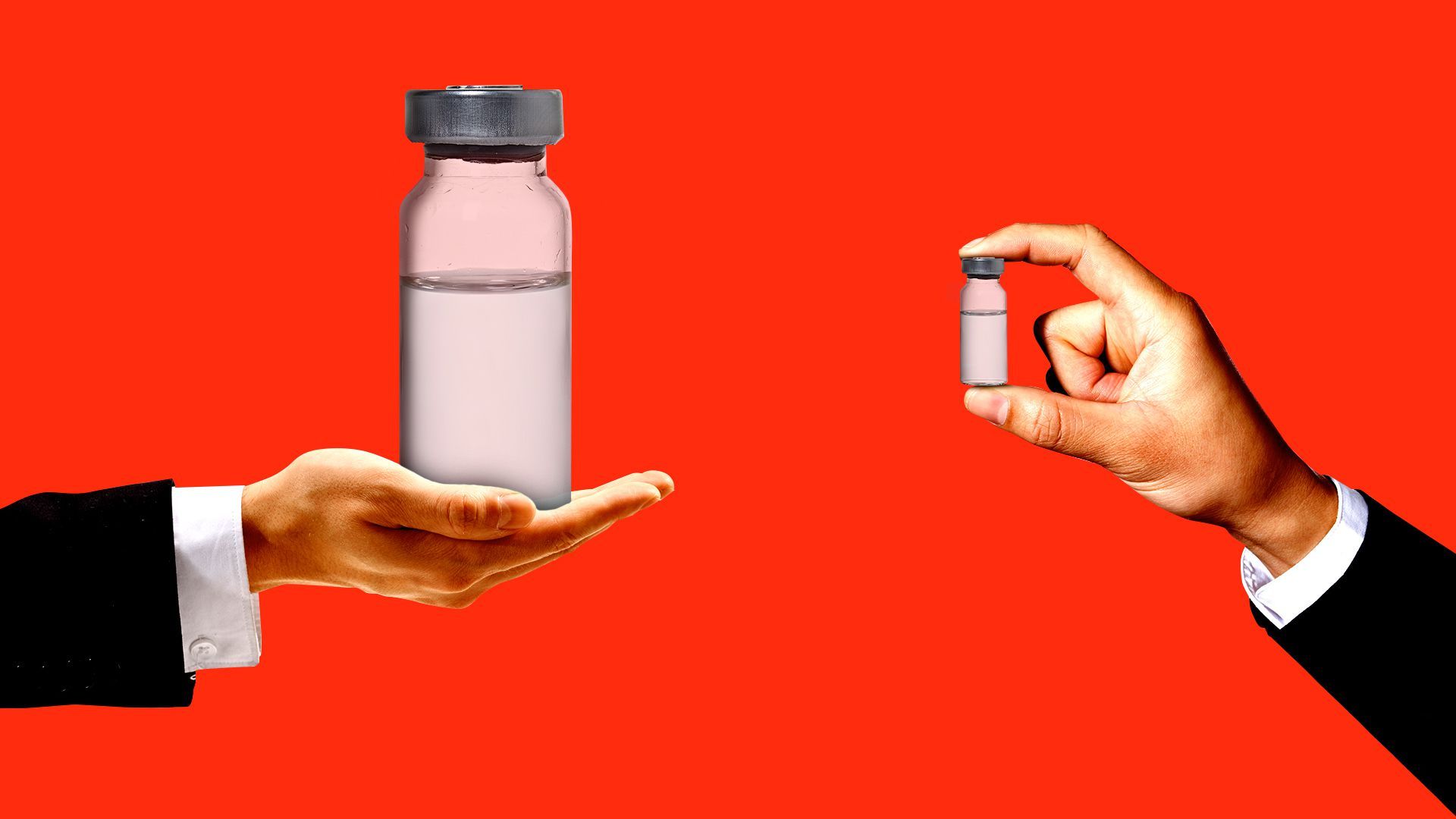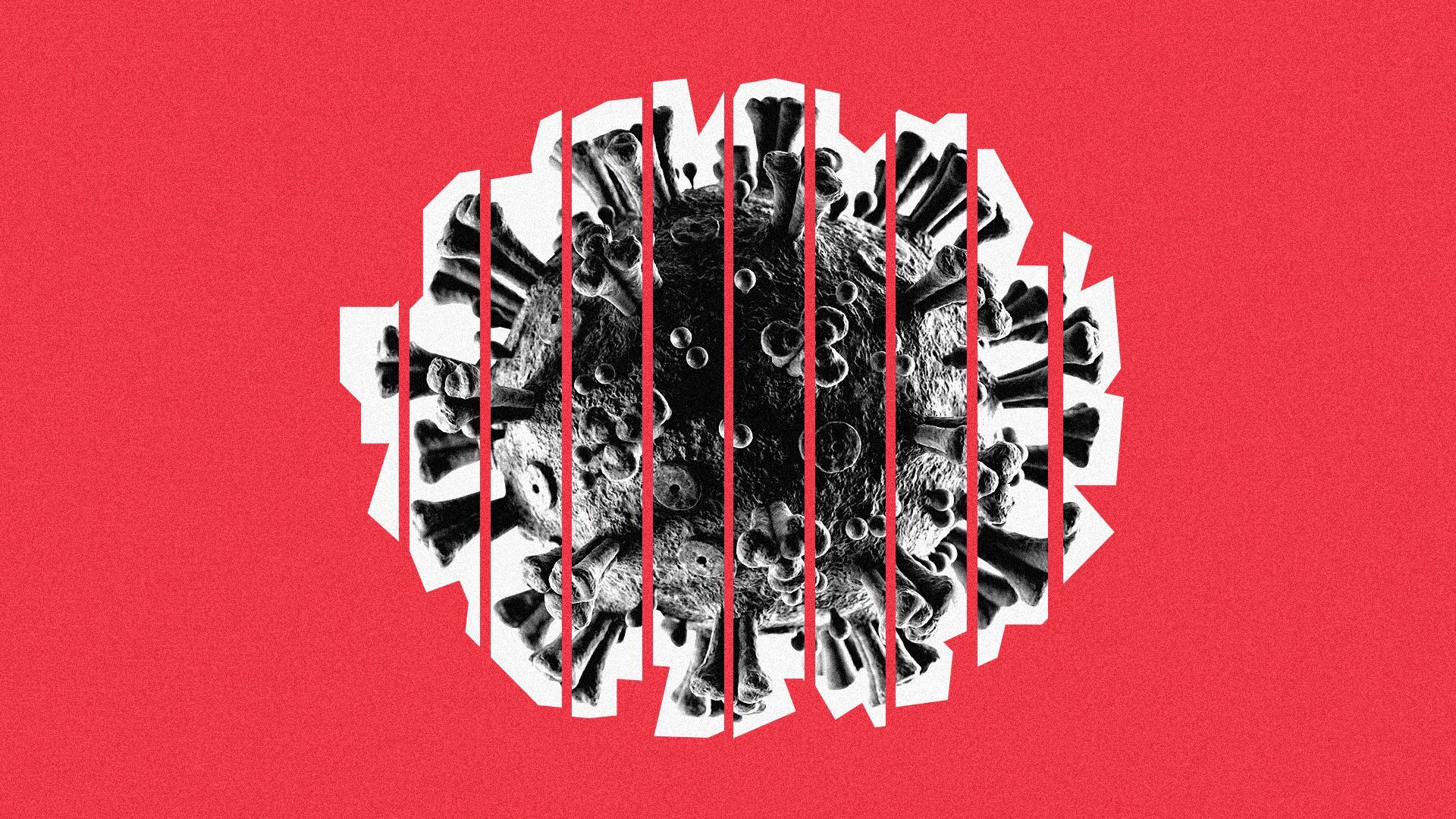| | | | | | | Presented By UnitedHealth Group | | | | Vitals | | By Caitlin Owens ·Apr 02, 2021 | | Good morning. This was the best content on the internet yesterday. Today's word count is 1,004, or a 4-minute read. | | | | | | 1 big thing: As cases rise, some experts want a new vaccine strategy |  | | | Illustration: Aïda Amer/Axios | | | | As coronavirus cases rise across the country, some experts are again calling to delay the second doses of vaccines — and to target vaccines to the hardest-hit areas. Why it matters: America's vaccination strategy should adapt to a changing pandemic, these experts argue. What they're saying: "It's time for the Biden admin to delay 2nd vax doses to 12 weeks. Getting as many people as possible a vax dose is now urgent," tweeted Atul Gawande, who was a member of President Biden's coronavirus transition team. "I was on the fence on this. I'm not anymore." - Part of what got him off the fence, Gawande said, is the fact that more dangerous variants are an increasing share of U.S. cases. He also pointed to a recent CDC study that found the mRNA vaccines reduced the risk of coronavirus infection by 80% after the first dose.
- A paper published yesterday in Nature argues that delaying or halving doses could slow the development of new, vaccine-resistant variants.
The other side: Opponents of delaying second doses — including the U.S. government, at least for now — note that we don't know how long immunity from just one dose lasts. - "We don't think it's worth taking the chance," NIAID director Anthony Fauci said. "We know that the level you get with a single dose, no question, is substantially lower than the level of antibody you get with a double dose. And we know that when we're dealing with variants, you need a cushion."
What's next: There's a separate debate brewing over whether more vaccine doses should be sent to hotspots. - Michigan Gov. Gretchen Whitmer and New York City Councilmember Mark Levine — representatives of the two biggest hotspots in the country — have recently advocated for that approach.
- But the White House isn't inclined to change its population-based distribution formula.
- "I think we shouldn't do that at the central level ... I don't think it's necessary," Fauci said. "I think it can be accomplished at the local level."
|     | | | | | | 2. The race between vaccines and emerging variants | Data: CDC/Axios Research/ GISAID; Graphic: Will Chase/Axios; Illustration: BrendanLynch/Axios Variant state of play: Growing evidence shows the three authorized vaccines currently offer protection against the variants, Larry Luchsinger, assistant member of the nonprofit New York Blood Center, tells Axios. - But Luchsinger and several other experts warn vaccinations must speed up in the U.S. and globally before a more serious variant pops up that renders the first generation of vaccines ineffective.
What's happening: The CDC is watching five "variants of concern" that can alter public health measures by having characteristics such as increased transmissibility, more severe disease or a higher death rate, and the ability to interfere with treatments or vaccine effectiveness, Axios' Eileen Drage O'Reilly and Will Chase report. - Those five variants, and the places they were originally detected, are: B.1.1.7 (U.K.), P.1 (Japan/Brazil), B.1.351 (South Africa), B.1.427 (California), and B.1.429 (California).
"The B.1.1.7 is a superspreader, in a way. It has a higher chance of spreading — about 50% to 70% more likely," says Ali Mokdad, professor of health metrics sciences at the IHME at the University of Washington. - The California variants (B.1.427 and B.1.429) are about 20% more transmissible than the original SARS-CoV-2, "but the vaccines are still fantastic and are doing a really good job," says Stacia Wyman, a genomics researcher who leads the sequencing effort in UC Berkeley's Innovative Genomics Institute.
- The South Africa and Brazil variants (B.1.351 and P.1) appear to render the current vaccines slightly less effective in experimental data. B.1.351 is also about 50% more transmissible, but the rate for P.1 is not yet known, per the CDC.
Explore the tracker. |     | | | | | | 3. Feds push forward on rapid coronavirus tests | | The federal government is pushing forward on rapid, at-home coronavirus tests, Axios' Marisa Fernandez reports. Why it matters: Testing remains an important part of controlling the pandemic, even as vaccinations continue to rise — both for people who haven't yet been vaccinated, and to catch emerging outbreaks early. Driving the news: The Food and Drug Administration issued an emergency use authorization this week for two over-the-counter coronavirus tests, from Abbott and Quidel. - Also this week, the Centers for Disease Control and Prevention and the National Institutes of Health announced a program that will provide volunteers in Tennessee and North Carolina with at-home tests.
- Recipients can also take part in an optional survey designed to determine whether frequent testing changes people's behaviors.
|     | | | | | | A message from UnitedHealth Group | | Three ways UnitedHealth Group is lowering drug costs | | |  | | | What we're doing:- Our PreCheck MyScript tool saves consumers an average of $225 on each prescription filled.
- The OptumRx discount card saves consumers up to 80% on retail drugs.
- Discounts at the pharmacy counter save consumers $189 per medication.
Learn more. | | | | | | 4. India's second wave hits the whole world |  Data: India Ministry of External Affairs; Chart: Danielle Alberti/Axios Facing a brutal new wave of coronavirus cases, India on Thursday made anyone over 45 eligible for vaccination. But the scramble to vaccinate as many people as possible has also meant sharply curtailing exports, Axios' Dave Lawler reports. Why it matters: The hopes of vaccinating the world have largely fallen on the shoulders of India, a vaccine manufacturing powerhouse and home to the world's largest producer, the Serum Institute. - Until recently, India was exporting most of the doses it was producing — a mix of donations to neighbors and other friendly nations, sales to countries like Saudi Arabia and the U.K., and contributions to the global COVAX initiative.
- Then, after a long lull, cases began to surge. They are now at their highest point since mid-October and are continuing to climb precipitously.
- Vaccine exports, which had been ramping up, suddenly fell sharply. Rather than supplying the world, the Serum Institute appears to have redirected nearly its entire supply to the homefront.
By the numbers: India has exported 6 million doses over the last three weeks, with less than 2 million of those going to the COVAX initiative. - That's down from 31 million in the three prior weeks, of which 16 million went to COVAX.
That's a crippling setback for COVAX, which is a critical source of vaccines for low-income countries, particularly in Africa. Go deeper. |     | | | | | | 5. Catch up quick |  | | | Illustration: Aïda Amer/Axios | | | | Pfizer and BioNTech announced Thursday that their COVID-19 vaccine was 91.3% effective at protecting against symptomatic disease up to six months after the second dose, with no serious safety concerns, according to an updated analysis of clinical trial results. Vaccine side effect for pharmacies: It's a boon for business, Axios' Courtenay Brown reports. Canada's three biggest provinces this week announced new coronavirus restrictions amid a surge in cases largely driven by COVID-19 variants, the Wall Street Journal reports. The Washington Nationals-New York Mets Opening Day game, which was set to kick off in the nation's capital on Thursday night, was postponed due to COVID-19 protocols, per ESPN's Buster Olney. |     | | | | | | 6. Dog of the week | | Ginger. Photo: Chris Paszkiewicz Meet Ginger! - "She's just over three years old, and is 50% Beagle, 25% Dalmatian, with a few other breeds mixed in," writes her dad, Chris.
- "Fun fact: she looks like a baby deer when she's not wearing a collar."
Ginger. Photo: Chris Paszkiewicz |     | | | | | | A message from UnitedHealth Group | | UnitedHealth Group's ideas to lower drug costs | | |  | | | How to lower drug costs: - Capping drug exclusivity can save Medicare more than $20 billion.
- Fully leveraging pharmacy benefit managers can save Medicaid $112 billion over 10 years.
- Value-based prescription drug payments can lower consumers' out-of-pocket costs by 28%.
Learn more. | | | | This newsletter is written in Smart Brevity®. Learn how your team can communicate in the same smart, clear style with Axios HQ. | | | | Axios thanks our partners for supporting our newsletters.
Sponsorship has no influence on editorial content. Axios, 3100 Clarendon Blvd, Suite 1300, Arlington VA 22201 | | | You received this email because you signed up for newsletters from Axios.
Change your preferences or unsubscribe here. | | | Was this email forwarded to you?
Sign up now to get Axios in your inbox. | | | | Follow Axios on social media:    | | | | | |
No comments:
Post a Comment